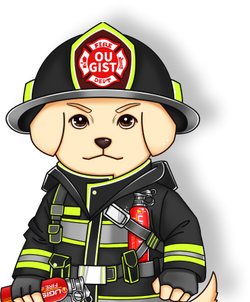Fire safety is a paramount concern in any environment, and the choice of fire extinguisher plays a crucial role in protecting lives and property. Water-based fire extinguishers, often associated with Class A fires, are a fundamental tool in fire suppression. In this blog post, we will delve into the characteristics of water-based fire extinguishers, their effectiveness, and their applications beyond Class A fires.

Class A Fires: Class A fires involve ordinary combustibles like wood, paper, cloth, and other materials that leave behind ash when burned. These fires are common in residential and commercial settings, making water-based fire extinguishers an essential tool for initial fire control.
How Water-Based Fire Extinguishers Work: Water is one of the oldest and simplest fire extinguishing agents. Water-based fire extinguishers work by cooling the fire, reducing the temperature below the ignition point of the fuel. This rapid cooling hinders the fire's ability to sustain itself, effectively extinguishing the flames. It is important to note that water should not be used on fires involving flammable liquids or electrical equipment, as it may spread the fire or create electrical hazards.
Advantages of Water-Based Fire Extinguishers:
-
Readily Available Agent: Water is widely available and cost-effective, making water-based fire extinguishers an economical choice for Class A fire suppression.
-
Minimal Residue: Water leaves little to no residue after extinguishing the fire, simplifying the cleanup process.
-
Environmentally Friendly: Water is a natural and environmentally friendly extinguishing agent, making it a preferred choice for green and sustainable initiatives.
-
Effective Cooling: The rapid cooling effect of water reduces the chance of re-ignition, preventing fires from rekindling.

-
Simple to Use: Water-based fire extinguishers are easy to operate, making them suitable for individuals without extensive fire safety training.
Applications Beyond Class A Fires: While water-based fire extinguishers are primarily designed for Class A fires, they can have applications beyond this class when modified or combined with other agents:
-
Water Mist Fire Extinguishers: These extinguishers disperse water into fine mist droplets, which can suppress fires involving flammable liquids, gases, and even electrical equipment. The mist's cooling and suffocating effects make them versatile for a range of fire classes.
-
Additive Solutions: Some water-based extinguishers incorporate additives or foaming agents to enhance their effectiveness on Class B fires (flammable liquids). These additives help smother the fire and prevent re-ignition.
Limitations and Considerations: Despite their benefits, water-based fire extinguishers have limitations, such as the inability to suppress fires involving electrical equipment and certain flammable liquids. It is crucial to assess the fire risks in your environment and ensure that the chosen extinguisher is suitable for potential fire scenarios.
If you need a home fire extinguisher, you can choose our OUGIST products.


